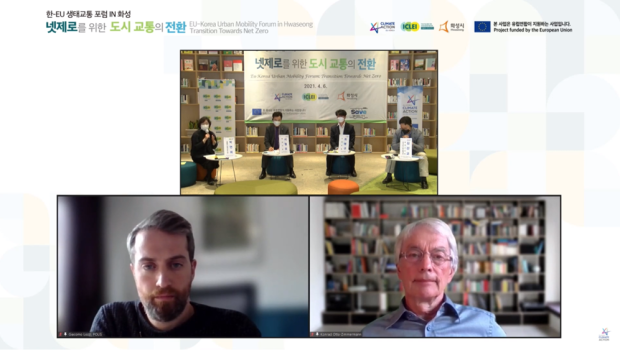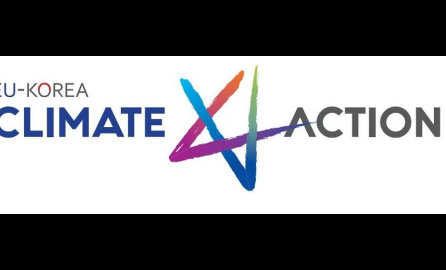Event 1: Urban Mobility Forum in Hawseong
The EU-Korea Climate Action Project in cooperation with ICLEI Korea and Hwaseong City organized the webinar, ‘the EU-Korea Urban Mobility Forum in Hwaseong’ on 6 April 2021, to share the EU and Korea’s innovative policies and programs for sustainable and low-carbon urban transport systems. The forum consisted of two main sessions: the presentation on best examples of cities´ sustainable urban transport systems and discussions on sustainable urban transport policies in the EU and Korea.
The event started with opening remarks delivered by Maria Castillo Fernandez, the Ambassador of the European Union to the Republic of Korea, and Cheol-mo Seo, the Mayor of Hwaseong City. The Ambassador said that the EU pledged a 90% reduction of greenhouse gas emissions from the transport sector by 2050 by boosting the uptake of zero emission vehicles, making alternative solutions of sustainable mobility available to the public and businesses, supporting digitalization and automation, and by improving connectivity and access in the EU.
After the keynote speech, the first session began with a presentation by Samu Balogh who informed about the Budapest Mobility Plan (BMT) - the city´s transport development strategy based on the EU's Sustainable Urban Mobility Plan. Having set out four objectives of the BMT such as more connections, attractive vehicles, better services, and efficient governance, the Budapest government aimed to address individual users' needs for mobility by treating them as partners, customers, and passengers and by reflecting their needs in establishing the mobility governance under the BMT. Measures applied include the extension of the cycling network, increasing of road safety measures, awareness raising campaigns, as well as education and training. He emphasized that the most difficult part of the transition is engaging everyone in achieving the set goal and objectives.
The second presentation was delivered by Reggie Tricker who focused on free public transport cases in the EU which aimed to helping with social issues as well as environmental problems. Based on the observations of the cases from Estonia, Luxembourg, Germany, UK, Belgium, and Vienna, he concluded that various factors and conditions have to be carefully considered in establishing fare-free public transport systems, such as the impacts of COVID-19, size of the city, social dimension, improving the services, and monitoring measures.
The next presentation was delivered by Sun-mug Choi, who addressed the background of the free public transport policy of Dangjin city, the implemented measures, results and future plans. Dangjin city’s free public transportation policy started in 2019 to address several issues such as the low number of available buses per capita in the city, the large land areas, the low percent mode share to buses, and air pollution. Dangjin city’s free transport policy has now entered its third phase of expanding the beneficiary coverage to include the youth population, as the previous coverage targeted at senior people above 75 years old, war veterans, and handicapped people. As the result, the policy increased the usage of public transportation by the beneficiaries by 30% on a year-on-year basis while reducing the average economic burden of target households by 93,000 KRW by month or 1,120,000 KRW on an annual average.
After the presentations, the discussion session followed focusing on the implementation of mobility policies in cities and the solutions to overcome challenges. Wun-ho Ryu joined the discussion along with the other three speakers. She pointed out that developing a sustainable transport system suitable for financial investment is one of the biggest challenges to overcome. She also emphasized the importance of evaluating the performance of free transport policy, taking into account diverse aspects such as the overall improvement in the quality of people’s life from social and scientific, healthcare and as well as environment perspectives. Ryu asked a question about the status of public transport in the EU in the midst of COVID pandemic. Reggie Tricker answered that the EU made a mistake by reducing the public transport in the beginning of the COVID-19 pandemic which eventually crammed people in a limited space and exacerbated the problem. He stated that Europe needs to expand public transport to provide more space to the users, as well as to maintain the infrastructure that’s been put in place for public traffic, such as cycling, to work more effectively.
The second session began with Cheol-mo Seo who presented the new vision of Hwaseong city’s mobility policy. Seo informed about the city’s efforts to achieve the sustainable mobility summared as: MOU signing with a local automobile company on producing buses with a 3D printer to lower the production costs significantly; agreement with Kia Motors to share the city’s owned electric vehicles with the staff and citizens to help them with commuting during the rush hour; continued expansion of the area subject to a speed limit below 30 km, to ensure the safety of pedestrians; introducing Green Point system which can be used as local money, to benefit the citizens commuting by foot or cycling.
The next presentation was delivered by Giacomo Lozzi from the POLIS Network who informed on Sustainable Urban Mobility Planning (SUMPs) of the EU. He defined SUMP as a strategic plan designed to satisfy the mobility needs of the people and businesses in cities to ensure a better quality of their lives. Under a sustainable and shared vision of prioritizing vulnerable people’s needs and efficient modes of transport, SUMP cycle spans on 12 steps such as understanding the available resources, determining the planning framework, target and indicator setting, and implementation plan. He added that SUMP is not only limited to solve traffic-related congestion problems, but also to improve the citizens’ quality of life and accessibility to mobility on a broader scale.
After the presentations, discussions started between Beyoung-kyu Choi, Sun-kyo Kim, and Konrad Otto-Zimmermann, together with the two speakers of the session. Zimmermann argued that urban transport system needs a systematic approach reflecting its complexity of barriers. Choi suggested several policy measures in order to achieve net zero Hwaseong city, which are - to include eco-friendly mobility modes such as walking and cycling into the public transport system, and to manage the transportation nodes, and engage citizens and local communities to participate in developing the vision of eco-mobility policy. Kim said Hwaseong city’s free transport policy was initiated for the first time in Korea, which still remains at the initial stage of its development. He encouraged more civic participation in the process of developing the policies.
The audience asked a question to Giacomo Lozzi about the areas of improvement needed with SUMP for achieving the goal. He responded that integration of mobility plans in line with cities’ other companion policies such as energy plan are needed. For example, in order for freight companies to fully utilize electric freight trucks, they will need an easy access to the electricity and grids infrastructure.

Related documents
Keynote speech_what free fare public transport liberates_Sangchul Kim
English (1016.55 KB - PDF)Sustainable urban mobility in Budapest - Samu Balogh
English (1.61 MB - PDF)Free public transport in European cities - Reggie Tricker
English (2.02 MB - PDF)Public transport innovation policies in Dangjin - Sung-mug Choi
English (3.97 MB - PDF)Sustainable urban mobility planing in EU cities - Giacomo Lozzi
English (2.97 MB - PDF)Urban mobility strategies to achieve Net Zero emissions - Konrad Otto-Zimmermann
English (729.86 KB - PDF)Urban Mobility Forum Program
English (593.37 KB - PDF)